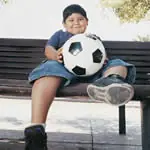
"My 10- year-old niece sure could skip a few meals ..."
"One of my kids is skinny, but the other child is chunky. How can I feed one but restrict the other?"
Most readers of my sports nutrition articles are lean and fit. But with more than 60 percent of Americans being overfat or obese, you likely have relatives who are fat, unfit, and unhealthy -- perhaps even your fifth-grade daughter who is pudgy or your chunky son who loves TV.
As a sports parent, you can be a good role model for athleticism and healthful food choices. But when it comes to controlling your children's eating and exercise practices, you likely feel more and more out of control with each passing year.
Once your child is old enough to march off and spend his or her allowance on candy, chips and soft drinks, what can you do to regain control without becoming the food police -- especially if your child is overweight?
The answer is complex, under-researched, and a topic of debate among parents and pediatricians alike. We know that restricting a child's food intake doesn't work. Rather, restricting kids' food tends to result in sneak-eating, binge-eating, guilt and shame -- the same stuff that adults encounter when they "blow their diets." But this time, the parents become the food police -- an undesirable family dynamic.
Food restrictions cause problems
Despite your best intentions to prevent creeping obesity, don't put your overfat child on a diet, deprive him of French fries or ban candy. Dietary restrictions don't work -- not for adults, and not for kids. Think about this: If diets did work, then the majority of people who have dieted would be lean. That's far from the case.
Diets for children cause more problems than they solve. They disrupt a child's natural ability to eat when hungry and stop when content. Instead, the child overcompensates and doesn't stop when he's content (binges) or stuffs himself with "last chance eating." You know what I mean: "Last chance to have birthday cake so I'd better eat a lot now because when I get home, I'm restricted to celery sticks and rice cakes."
If you're a parent of a chubby child, note that children commonly grow out before they grow up. That is, they often gain body fat before embarking on a growth spurt. Instead of putting your daughter on a diet (which damages self-esteem and imprints the message she isn't good enough the way she is), get her involved in sports and other activities.
You can delicately ask her if she's comfortable with her body. If she's discontent with her physique and expresses a desire to learn how to eat better, arrange for a consultation with a registered dietitian who specializes in pediatric weight control (Use the American Dietetic Association's referral network at www.eatright.org). You can also read books such as Ellyn Satter's Your Child's Weight: Helping Without Harming and Secrets of Feeding a Healthy Family.
Is your child really overfat?
If you're feeling anxious about your child's weight, get some professional advice from your pediatrician to determine if the problem is real. You must remember the body your 10-year-old daughter has during pre-puberty will change as she grows and develops. You can also monitor your child's weight on charts available at www.cdc.gov/growthcharts.
Some parents are rightly concerned about their child's weight; we're seeing more and more medical problems with childhood diabetes, high cholesterol and high blood pressure. But for other parents, the concerns about their child's weight reflects their own anxiety about having an "imperfect" kid.
Yes, you say you want to spare your child the grief of being fat, but be sure to examine your own issues. If you're very weight-conscious and put a high value on how you look, you may be feeling blemished if your child is overfat. Often, the child's weight problem is really the parent's issue. You may want a "perfect child."
Be sure to love your overfat child from the inside out, and don't judge him or her from the outside in. Comments like "that dress is pretty, honey, but it would look even better if you'd just lose a few pounds ..." can get interpreted as "I'm not good enough." This can cause self-esteem to take a nose-dive and contributes to anorexic thinking, such as "thinner is better."
Weight management tips
So what can you do to help fat kids slim-down? Instead of maligning them and trying to get them thin by restricting food, we can get them healthier by helping them see the benefits of being more active. This could mean watching less TV, planning enjoyable family activities (unlike boot camp), and perhaps even creating a walking school bus with the neighborhood kids.
As a family, you might want to sign up for a charitable walking or running event. As part of a society, make your voice heard about the need for safe sidewalks, health clubs that welcome overfat kids, swimming pools that allow children (and adults, for that matter) to wear T-shirts and shorts instead of embarrassing bathing suits.
Food-wise, provide your kids with wholesome, nourishing foods, as well as semi-regular "junk foods." (Otherwise, they'll go out and get them). Encourage them to eat breakfast. Plan structured meals and snacks; take dinnertime seriously.
Your job is to determine the what, where and when of eating; the child's job is to determine how much and whether to eat. (That is, don't force them to finish their peas, nor stop them from having second helpings.) If you interfere with a child's natural ability to regulate food, you can cause a lifetime of struggles. Trust them to eat when hungry, stop when content -- and have plenty of energy to enjoy an active lifestyle.
Sports dietitian Nancy Clark, M.S., R.D., counsels casual and competitive athletes at Healthworks, the premier fitness center in Chestnut Hill, MA (617-383-6100). Her best-selling Nancy Clark's Sports Nutrition Guidebook, Food Guide for Marathoners and Cyclist's Food Guide are available at www.nancyclarkrd.com.
Copyright Nancy Clark, September 2005









Discuss This Article